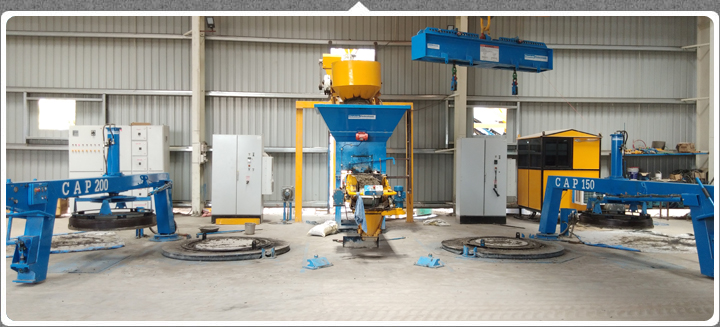
For precast concrete products, mould equipment is a crucial component of the process. This machinery allows for precast concrete products to be manufactured to specific tolerances, including dimensional accuracy and surface finish. Various moulds are available, and some of them offer features such as lift walls and special wall panels. The best moulds are designed for maximum productivity and ease of use.
Importance of Choosing the Right Mould Equipment Manufacturer
When selecting mould equipment for precast concrete production, working with a reputable mould equipment manufacturer is critical. A trusted manufacturer ensures that the moulds are engineered with precision, using high-quality materials that can withstand the rigors of the concrete casting process. Whether the moulds are made from steel, C-channels, or flat bars, the expertise of the manufacturer determines the durability, accuracy, and overall performance of the equipment.
Reliable mould equipment manufacturers provide custom solutions, tailored to the specific needs of each project. They also offer comprehensive maintenance support and guidance on best practices for optimizing production efficiency. Choosing the right equipment manufacturer not only affects the quality of the precast concrete products but also impacts operational efficiency, ensuring that manufacturing facilities meet their production goals without unnecessary downtime or costly repairs.
A mould can be made from steel plates, C-channels, flat bars, or other forms. The moulds can be manufactured with a variety of materials and thicknesses. The moulds may be as small as one mm in diameter or as large as five metres, depending on the material used to make them. For large products, pre-stressed concrete moulds are needed. The moulds can be as long as 150 metres, and can be heated to accelerate the curing process. The wire stressing process is usually achieved with the use of a handheld hydraulic jack or by using a stressing/destressing head fitted to the mould’s ends. Various mould designs are used to produce various elements at once, including masonry, roof, and floor elements.
Versatile Moulds for Precast Concrete Products
The wide variety of moulds for precast concrete products allows manufacturers to create an extensive range of structural and architectural components, including beams, columns, wall panels, and more. These versatile moulds can be adjusted for different sizes and shapes, making it easy to customize products for specific building requirements.
In addition to traditional steel and heavy-duty plastic moulds, modern precast concrete moulds often incorporate advanced features such as self-compacting concrete technology, which ensures a smooth finish with minimal surface defects. Moulds can also be designed with interchangeable parts, making it easy to switch between different elements without lengthy setup times, thus boosting productivity.
With the ability to create everything from small architectural details to large structural components, these moulds for precast concrete products are essential for manufacturers seeking to expand their product offerings and meet the demands of today’s construction market.

The most common moulds for precast concrete include beam and column moulds. They are commonly constructed of steel or heavy duty plastic and are easily cleaned. Some moulds can be positioned for a variety of elements. Some of these moulds can be adjusted by raising or lowering the base plate. Changing the base of the moulds allows you to cast a different width. A column is a very versatile construction product.
The Tilting mould is a type of precast concrete mould. It is used to cast wall panels horizontally. When the mould is tilted, the panels are handled vertically. This method is done by hydraulic jacks. This type of mould has a mould finish on one side, and needs to be finished by a skilled mason. This equipment is essential for making concrete products.
Innovations in Precast Concrete Mould Manufacturing
Advances in technology have revolutionized the precast concrete industry, leading to innovations in mould design and production. Modern precast concrete mould manufacturers are now incorporating automated systems and advanced materials into their production lines, resulting in moulds that are more durable, accurate, and easier to maintain.
One such innovation is the use of modular mould systems, which allow manufacturers to quickly adjust mould sizes and shapes to accommodate different product specifications. This reduces setup times and increases production flexibility. Additionally, automated mould cleaning systems and hydraulic actuators make the process more efficient, lowering labor costs and improving product consistency.
Precast concrete mould manufacturers are also exploring sustainable manufacturing practices, such as using recycled materials in mould production and designing moulds that minimize concrete wastage. These innovations help manufacturers meet both economic and environmental goals, making them more competitive in the global market. It is vital for the smooth and efficient operation of a factory.
Precast Concrete Mould Manufacturers in India
India is home to a growing number of precast concrete mould manufacturers, who are leveraging both traditional craftsmanship and modern technology to produce high-quality moulds for a variety of applications. The precast concrete mould manufacturers in India are recognized for their ability to produce durable, cost-effective moulds that meet international standards.
Indian manufacturers have made significant strides in developing custom solutions for infrastructure projects, including precast concrete products for highways, bridges, and high-rise buildings. Many of these companies are investing in state-of-the-art machinery and automated systems, ensuring that their moulds offer the precision and reliability required for complex projects.
Additionally, Indian manufacturers are known for offering a wide range of products at competitive prices, making them a preferred choice for both domestic and international construction projects. Their expertise in precast concrete mould design and production has positioned them as key players in the global precast industry.
Recent Articles
- How Drycast Technology is Changing the Concrete Pipe Industry?
- Common Mistakes to Avoid When Selecting Pipe Moulds for Your Machine
- How to Match Your Concrete Pipe Making Machine with the Perfect Drycast Mould?
- How to Keep Concrete Pipe Machine and Drycast Moulds in Top Condition? Maintenance Guide
- Box Pallets & U-Drain Pallets: Essential Components in Modern Drainage Systems





 BACK TO ARTICLES
BACK TO ARTICLES